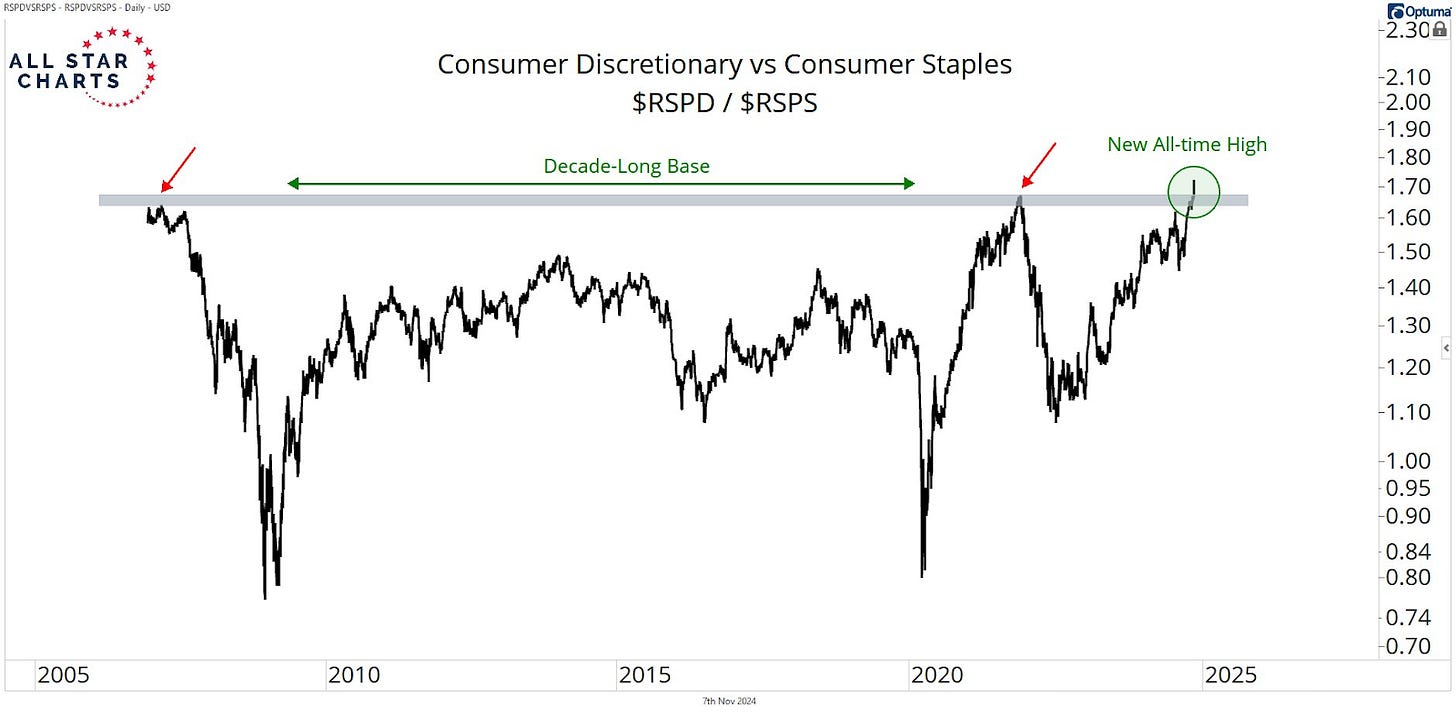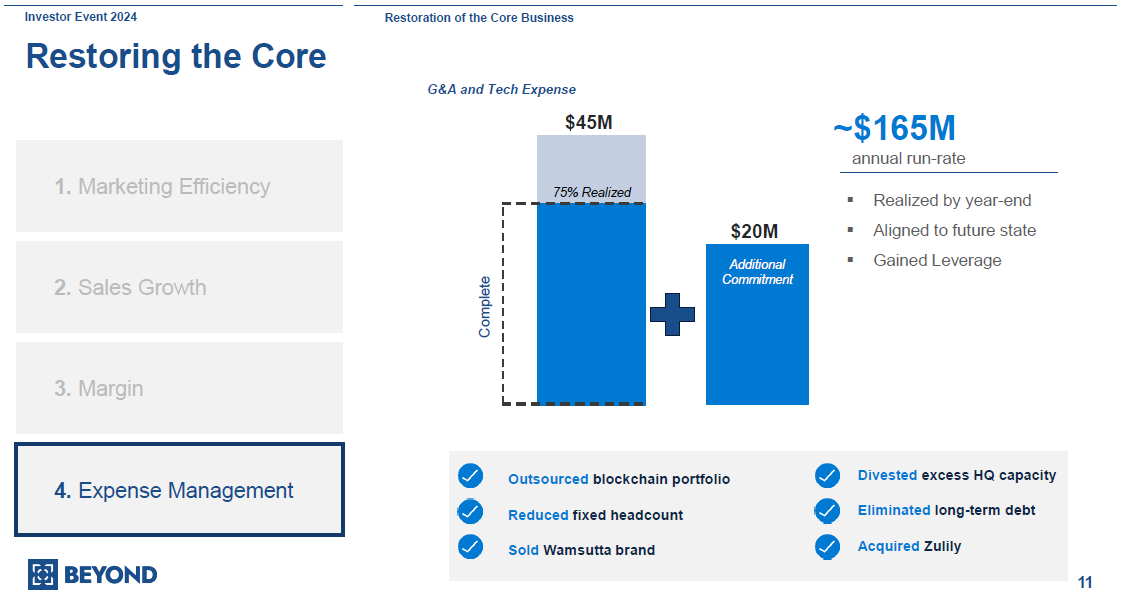Beyond Inc $BYON, The Container Store $TCS, Kirkland’s $KIRK: Update of the Update of the Update
Ten Bagger or Bust
More and more tidbits of analysis keep coming in that Consumer Discretionary is going to be one of the winning sectors for 2025:
The Container Store (TCS)
The Container Store (TCS) is starting to turn into a telenovela. While there is opportunity here, I can’t help but wonder if the time spent would be better spent looking for other opportunities.
The most dramatic news is Amit Agarwal, the patent attorney from St. Petersburg, Florida, who had accumulated a 19% position in TCS, exited completely after management adopted a poison pill. Agarwal was hoping for a quick flip, and the 30% shareholder, Leonard Green & Partners, and the 9% shareholder, Glendon Capital, said no. The stock was volatile enough without this, but wow, have you ever seen a three month chart like TCS’?
Earnings on the 29th of October weren’t stellar, but weren’t terrible either. Same store sales were down over 10%, but the custom closet business was down 2%, after being up 1.5% last quarter. And this is in the middle of a consumer durables armageddon where existing home sales are at the levels of 1995. Management points to custom spaces ordered but not yet delivered is up 4.5% year over year, pointing to sales improvement toward the end of the quarter. Without allowing myself to become overly optimistic, this does point to the possibility that the bottom is in for the cyclicality of TCS’ business, or that the Christmas season bump is already upon us.
TCS has $66 million in cash, and another $30 million undrawn on their revolving credit line. Meanwhile, last quarter, the cash position improved organically with $12 million of operating cash flow minus $6 million of capex. Operationally, TCS is not in serious danger, unless the market deteriorates further. Which it could, but we are heading into the Christmas season, which straddles the next two quarters which are seasonally TCS’ strongest quarters.
Regarding leverage and debt covenants, TCS has about $230 million of long term debt. The term loan facility is due on Jan 31st of 2026, just a little over a year away, but the revolver is due on October 2025, if any of the term loan is left outstanding. Obviously, when these two debts were incurred in 2012, it would have been hard to anticipate that the maturities would align with a consumer durable apocalypse, and record high interest rates. TCS is in dire need of a complete debt refinancing in short order, and I believe this is the reason why TCS trades at a market capitalization of $15 million, for a company with peak revenues of $1 billion and positive free cash flow. Management added going concern language to the last quarterly filing due the the threat of these debt maturities.
Credit spreads are tight, liquidity is ample, if TCS is a decent business, there should be an opportunity to refinance their debt. With such thin margins currently, however, the increased interest expense would almost certainly turn TCS cash-flow negative.
As I mentioned in the previous update, Beyond Inc (BYON), formerly Overstock.com, the acquirer of Bed, Bath, and Beyond’s intellectual property and digital assets, is pursuing a partnership with The Container Store. As a part of that strategic partnership, BYON is offering $40 million for convertible preferred stock that would amount to a 40% stake in TCS. But under the condition that TCS refinances their debt by November 15th, next week. There is language, however, that the deadline can be waived if everyone wants to waive it. A $40 million reduction in debt, and a complete refinancing to remove the debt maturity wall would be an enormous catalyst for TCS.
Beyond (BYON)
There are likely positive synergies from a cooperation between BYON and TCS. TCS mentions that they would benefit from access to BYON’s superior data analytics and financing options. BYON would benefit from access to TCS’ retail space to become an omni-channel retailer and get better negotiating terms from suppliers than a drop-shipper. But before any of that can happen, BYON has it’s own dumpster fire to put out. On the last quarterly earnings call, a three hour fireside chat, management referred to recent results as “unacceptable.”
Unlike TCS, BYON lost $32 million last quarter, and $36 million the quarter before. Also unlike TCS, BYON has $140 million in cash, and no long term debt. The source of the current financial troubles are due to the failed integration between Overstock and Bed, Bath, and Beyond. BYON tried to merge the inventory across all websites, and left customers confused and overwhelmed with 13 million SKUs, conversion from visits to purchases fell from 2.2% to 1.3%. Management is in the process of fixing this mistake by separating the SKU’s so that Overstock.com and Bedbathandbeyond.com have the selection of goods that customers expect. BYON also laid off 20% of their workforce, but the flowthrough to reduced SG&A is probably still two quarters away.
BYON’s management believes that their turnaround back to historical margins and profitability is two to three quarters away, but that next quarter should show some dramatic improvements on both revenue and margins. In addition to the $140 million in cash that BYON has, although $40 million might be going to TCS, BYON has announced the closing of the sale of their headquarters with proceeds to come next quarter. BYON is also looking to monetize some investments they had made in a couple of blockchain companies in order to raise funds to bridge this turnaround. BYON had previously invested approximately $45 million into Medici Ventures, which has equity stakes in 17 different block chain companies. Hopefully for BYON’s sake, some of those 17 are now worth more than they paid for them. BYON’s management prefers to do the turnaround without these liquidations, but would probably sell assets before taking on debt.
Looking forward longer term, BYON is not only partnering with TCS, but they also signed a similar deal with Kirkland’s (KIRK). Management seems to truly believe that a return to omnichannel sales for the Bed, Bath and Beyond products is essential.
What an interesting pair of companies, one operationally stable with a terrible balance sheet, the other operationally terrible but with a pristine balance sheet. The market seems to prefer BYON, valuing them at 10% of peak 2022 revenue, while TCS is valued at 1.5% of peak 2022 revenue. So can we speculate as to how likely the strategic partnership between TCS and BYON is to go through? TCS really needs the cash, and BYON says they really need the retail presence. That would indicate that even if refinancing for TCS can’t be achieved before November 15th, the two will figure out how to build a bridge going forward. My best guess is that yes, the partnership will consummate.
Interestingly, the dilution from the BYON investment brings the two stocks to almost perfect parity, both are approximately ten baggers if the turnaround is successful, and their multiples return to some reasonable price to sales ratio. TCS is currently where BYON is trying to return to, approximate breakeven or slight profitability in a terrible macro environment. BYON believes they can, within two to three quarters, go from a $32 million loss, to between a $6 million to $12 million profit, without any change in the macro environment. But TCS is going to be burdened with interest expense, even if they successfully refinance their outstanding debt.
Going forward, I had already started a position in TCS, but I don’t think I will buy any more. Since BYON is going to own 40% of TCS, and could easily get a 10x return on their investment there, and BYON is also trading at 10% of peak revenue, and could be a ten bagger itself, I think I will start a small position in BYON instead of buying more TCS. BYON has enough cash to last three quarters at their current burn rate, which they have a credible plan to improve. And, BYON has no long term debt and several hidden assets to liquidate if needed. TCS has a lot less wiggle room on their balance sheet, and BYON will own 40% of TCS anyway. The part of the business I want to own is the custom closet business, but now I can own that business by buying TCS or BYON, assuming the strategic partnership goes through, which I anticipate it will.
TCS shareholders are currently concerned that BYON will seek to acquire all of TCS since the current price is so cheap. I do not believe this is a part of BYON’s strategy, BYON wants to stay asset light, but to have the negotiating power of a retail store, and enjoy dramatically improved margins without building out retail stores or maintaining an inventory.
Kirkland’s (KIRK)
In the worst position of the three, Kirland’s (KIRK), has been cash flow negative, and is burdened with long term debt. I think I would rather own either TCS or BYON than KIRK. KIRK’s weakness makes me more confident that if BYON really believes they need the retail partnership, they wouldn’t put all their eggs in KIRK’s basket.








I think I have truly turned into a degen myself, blinded by the upside potential here. My current position size is 2% with 6$ avg. cost.
Maybe I don't see why the debt is such a problem. Why does management, if they are good operators, continue to invest in opening new stores instead of paying down debt from their operating cash flow?
When buying Byon, you are effectively buying TCS at 17$, since that's the strike price of the preferred debt.
Since today's price is approx 4.5$, are we not 40x our investment when byon will 10x their equity in TCS. Also Byon itself to 10x needs its own thesis to play out right? I.e if TCS succeeds in custom closet business, it is still possible that their overstock and bb&beyond business will fail, so not sure if I agree buying Byon is better than buying TCS here.